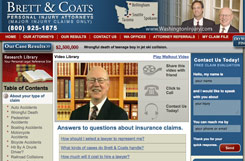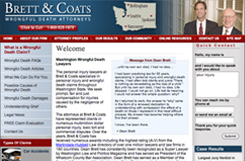Share Your Story
Click here to share your story about drunk driving.
On July 17th, 2003 at 1 a.m. while working a vehicle accident, I was struck by a drunk driver. I lost everything I had. My wife left, as 1 year of watching me have seizures and not get better was too much for her. More
Drunk Driving News
Drunk Driving Fatalities Drop to Lowest Rate since 1950
The U.S. Department of Transportation recently announced that U.S. fatalities due to drunk driving fell to a record low number in 2009, declining by 7.4% from 2008, with a 19% decrease since 2000. This represents the lowest number since 1950. More
Drug and Alcohol Courts: An Effective Alternative to Jail
Drug courts were developed in the 1980's in an effort to stop the abuse of alcohol and other drugs, and to reduce the criminal activity that typically accompanies these behaviors. More
Hold Drunk Drivers Responsible
What you can do to prevent drunk driving
Understand how drinking impairs the ability to drive.
Alcohol affects every organ in the body. It is a central nervous system depressant that is rapidly absorbed from the stomach and small intestine into the bloodstream. Alcohol is metabolized in the liver by enzymes; however, the liver can only metabolize a small amount of alcohol at a time, leaving the excess alcohol to circulate throughout the body. The intensity of the effect of alcohol on the body is directly related to the amount consumed. The result can be difficulty walking, blurred vision, slurred speech, slowed reaction times, impaired memory, and blackouts. Long-term affects include brain damage, severe liver disease, and death.
Go to Strategies to Stop Impaired Driving to learn more about the facts of drinking and driving.
- Involve the family in preventing underage drinking: Talk to your teens and children about the dangers and risks of alcohol. Answer their questions honestly when they ask about your own history with alcohol or your current drinking habits. The more comfortable children feel about speaking about alcohol and alcohol use, the better informed they will be about the risks.
- Be a responsible host: never let your friends drive after drinking alcohol. Plan to have plenty of non-alcoholic drinks available, as well as lots of food. Plan who is going to serve as a designated driver, or arrange to call a taxi, or organize a car pool.
- Be a good friend: Most problem drinkers and alcoholics deny their problems and that their drunk driving is a dangerous and criminal act. If you really want to help when you see your friend has been drinking and wants to drive, tell them no and offer alternatives. If you're convinced that your friend or family member needs help, tell them so.
If you think that someone you know might have an alcohol problem or is an alcoholic, here are some things that can help.
- Understand the myths of drinking:
-
Myth 1: Many people believe that after drinking they will be capable of making a decision regarding whether they are capable of driving or not. Some people exhibit obvious signs of impairment after consuming alcohol, such as slurring their words or having trouble walking. It’s easy to know that person should not be driving. However, other people don’t show their impairment as obviously. Not everyone who is impaired has visible symptoms.
Fact: You can’t tell if someone is able to drive just by looking at them. -
Myth 2: Beer and wine are less intoxicating than hard liquor. Some people believe that one kind of liquor affects them less than another; but an ounce of alcohol has the same power to affect the drinker regardless of the type.
Fact: A 12 ounce can or bottle of beer, a 5 ounce serving of wine, and a 1.5 ounce shot of hard liquor all have about the same amount of alcohol. A six-pack of beer has about the same alcohol content as six average mixed drinks. You can’t tell how much alcohol someone has had by just counting their drinks. Some mixed drinks contain more than one shot of alcohol. -
Myth 3: Coffee, cold showers, exercise, or other home remedies can make someone sober.
Fact: Nothing can speed up the body’s rate of processing alcohol except time. While a number of factors affect how quickly someone becomes impaired (their mood, their weigh, how much food is in their stomach, their gender, etc.), the body needs about one hour to process each ounce of liquor. A person who has had five drinks in two hours burns off only about two ounces of the alcohol and will need at least three more hours of non-drinking time to become sober.
-
Myth 1: Many people believe that after drinking they will be capable of making a decision regarding whether they are capable of driving or not. Some people exhibit obvious signs of impairment after consuming alcohol, such as slurring their words or having trouble walking. It’s easy to know that person should not be driving. However, other people don’t show their impairment as obviously. Not everyone who is impaired has visible symptoms.
- Admit the truth. The person has a drinking problem and may be an alcoholic.
- Learn about alcoholism. The more you understand about alcoholism, the better you will be able to cope with the alcoholic, your family, and yourself.
- Don’t blame yourself. Don’t allow the alcoholic or anyone else to blame you for the alcoholism; you neither caused it nor can cure it.
- Continue with your own life. Don’t allow the alcoholic to control your life. Pursue hobbies and friendships that are meaningful to you and your family.
- Take Action: Model and encourage safe behavior by designating a driver or planning on using public transportation.
- Encourage the person to see a doctor or other health care provider right away. They can help determine if a drinking problem exists and help plan the best course of action, because although many people are able to recover from alcoholism, most people will need help to achieve this.
- Seek assistance. Encourage the person to enter an alcohol treatment program. Regardless of the response, enter a program yourself. You will meet others who live with alcoholics and learn ways to cope with them. A treatment program or Al-Anon will teach you how to intervene with the problem.
- Make a plan. If you live with the person who refuses to change, consider asking him or her to leave. Or, you may need to leave yourself. Loving an alcoholic does not require that you stand helplessly by. You must be the one strong enough to take action to change the situation. Make a plan with the help of your family and other trusted advisors, and be prepared to follow through with the plan.
- Never ride with a person who has been drinking. This protects your safety and gives a clear message that you will not tolerate or condone such behaviors.
Previous info From MADD - Someone You Know Drinks & Drives.
More escalated measures when the above have not been effective.
- Contact the Department of Motor Vehicles or Department of Public Safety if you have reason to believe that a person has provided false information to obtain a new driver’s license. Lying or failing to provide accurate information in order to obtain a license is a criminal offense punishable by license revocation and/or jail. You may make the call anonymously, but you will need to provide the driver’s name, date of birth, license plate number, and place of employment.
- Contact Local Call Law Enforcement if the person of your concern continues to drink and drive in spite of your efforts. Call the police immediately after he or she leaves and give a description of the car, the driver and the direction of travel. This can be done anonymously. Be aware that law enforcement agencies vary widely in their interest and ability to respond to such calls, but many law enforcement agencies will make an effort to locate the vehicle. If they do spot it, they will be able to pull the car over only if they have probable cause to do so. This means the police officer must observe the vehicle being driven in such a way that the officer believes the driver may be intoxicated. Many states have a toll-free hotline for reporting suspected drunk drivers. Your State Highway Patrol or State Police can tell you if such a number is available in your state.
- Contact the Prosecuting Attorney. If the person has already been charged with an alcohol-related crime and was released on bond or bail, call the prosecuting attorney’s office and inform them about the ongoing problem. The prosecuting attorney may be able to recommend an appropriate course of action.
- Contact the Defense Attorney. The person’s defense attorney should have advised him or her to stay out of further trouble with the law. You may want to inform the defense attorney that his or her client continues to drink and drive.
- Contact the Probation and Parole Authorities. A person who has been convicted of a crime can be put on probation or parole. People on probation or parole are required to do certain things as elements of their sentences. A person who violates one or more of the required elements of probation or parole runs the risk of having their probation or parole revoked and going to jail or prison to serve the remainder of their sentence. If the person is on probation or parole, even for a non-alcohol-related offense, and continues to drink and drive, contact their probation or parole officer to report this illegal activity.
Reporting someone you care about to the authorities can be a very painful step. In the long run, however, it may be more caring than taking no action, your silence may imply that you support the drinking and driving.




